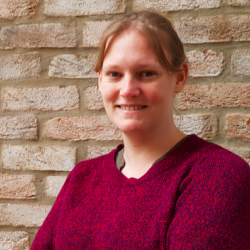Biography
I am a postdoctoral researcher at the Department of Theoretical and Applied Linguistics at the University of Cambridge.
I got my PhD from the University of Groningen (RUG) in 2017. My dissertation is titled Reference and Cognition: Experimental and computational cognitive modeling studies on reference processing in Dutch and Italian. From 2017-2019, I worked as a postdoctoral researcher at the Institute of Dutch studies at the University of Oldenburg (UOL).
Research
My research combines psycholinguistic, statistical, and cognitive modeling methods to investigate different aspects of language processing. Specifically, I work on syntactic and semantic processing throughout the lifespan. My research entails both written and spoken language processing, both offline (comprehension) and online (eye-tracking, fMRI). Additionally, I am interested in the influences of cognitive abilities on language processing.
My research interests include, but are not limited to, psycholinguistics, language processing, syntax, semantics, pragmatics, cognitive science, (cognitive) neuroscience, cognitive modeling, language acquisition, aging, pronoun processing, cross-linguistic comparisons, and individual differences.
Publications
-
Vogelzang, M., Guasti, M. T., Van Rijn, H., & Hendriks, P. (2021). How children process reduced forms: A bounded-rational modeling approach to pronoun processing in discourse. Cognitive Science, 45, e12951. doi:10.1111/cogs.12951
-
Vogelzang, M., Thiel, C. M., Rosemann, S., Rieger, J. W., & Ruigendijk, E. (2021). Effects of age-related hearing loss and hearing aid experience on sentence processing. Scientific Reports, 11, 5994. doi:10.1038/s41598-021-85349-5
-
Tsimpli, I., Vogelzang, M., Balasubramani, A., Marinis, T., Alladi, S., Reddy, A., & Panda, M. (2020). Linguistic diversity, multilingualism and cognitive skills: A study of disadvantaged children in India. Languages 5(1):10
-
Vogelzang, M., Thiel, C. M., Rosemann, S., Rieger, J. W., & Ruigendijk, E. (2020). Neural mechanisms underlying the processing of complex sentences: an fMRI study. Neurobiology of Language, 1(2), 226-248. doi:10.1162/nol_a_00011
-
Vogelzang, M., Hendriks, P., & Van Rijn, H. (2016). Pupillary responses reflect ambiguity resolution in pronoun processing. Language, Cognition and Neuroscience, 31(7), 876-885. doi:10.1080/23273798.2016.1155718
Publications (from Symplectic)
2024 (Published online)
Doi: 10.5070/g6011225
2024
Doi: http://doi.org/10.1017/S0142716424000316
Doi: http://doi.org/10.1080/0361073X.2024.2432238
Doi: http://doi.org/10.1002/tesq.3326
Doi: http://doi.org/10.1017/langcog.2024.48
Doi: http://doi.org/10.1177/13670069231198224
2023
Doi: 10.1111/1467-9817.12425
2022
Doi: http://doi.org/10.3390/languages7010033
2021
Doi: http://doi.org/10.1044/2020_JSLHR-20-00262
Doi: http://doi.org/10.1038/s41598-021-85349-5
Doi: http://doi.org/10.1111/cogs.12951
Doi: http://doi.org/10.1002/aur.2542
Doi: http://doi.org/10.1162/nol_a_00055
2020 (Published online)
Doi: 10.7557/12.5256
2020
Doi: http://doi.org/10.1080/0163853X.2019.1591127
Doi: http://doi.org/10.3390/languages5010010
Doi: 10.1162/nol_a_00011
Doi: http://doi.org/10.4000/discours.10679
Doi: 10.33774/coe-2020-th322
Doi: 10.33774/coe-2020-2tj3m
2017
Doi: http://doi.org/10.3389/fcomm.2017.00011
2016
Doi: http://doi.org/10.1080/23273798.2016.1155718
2013
Doi: http://doi.org/10.1016/j.trf.2012.12.012

